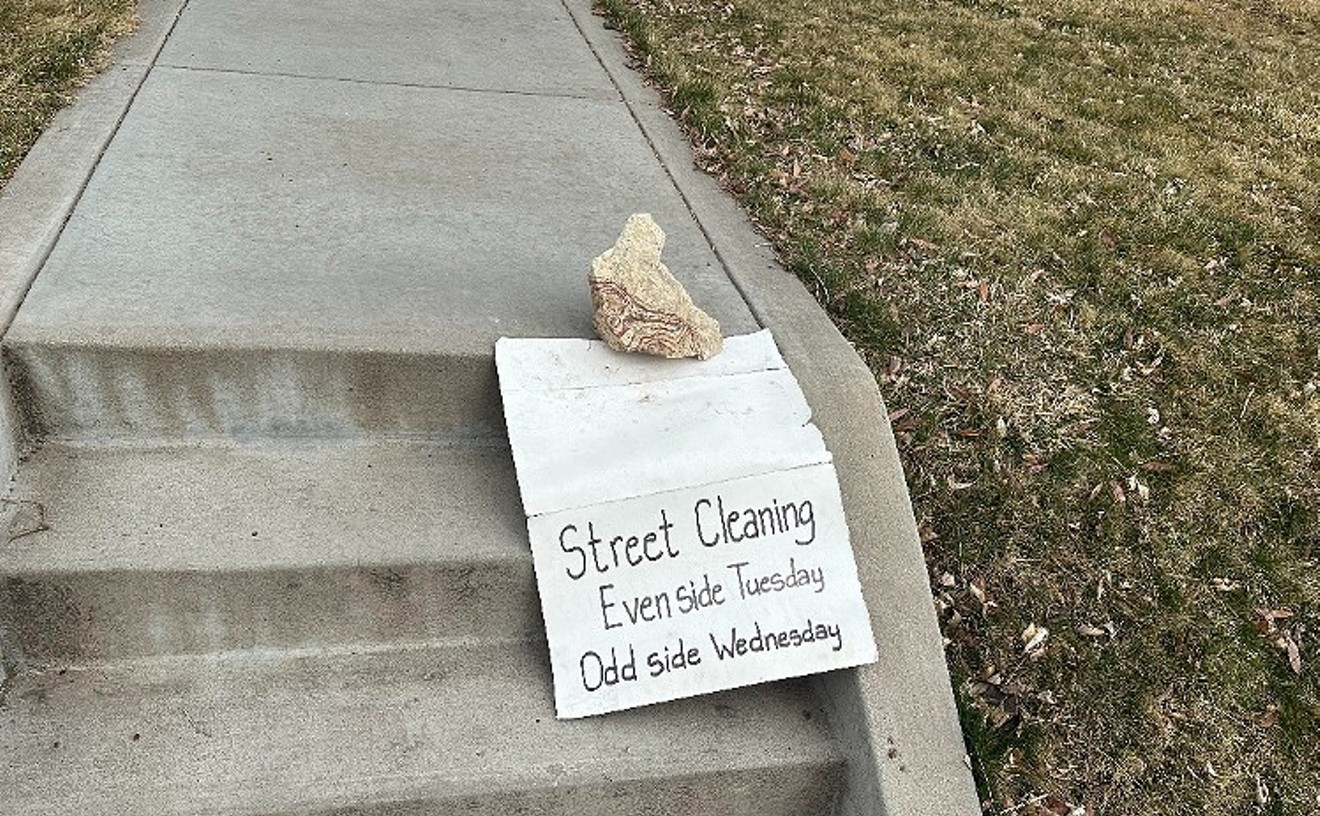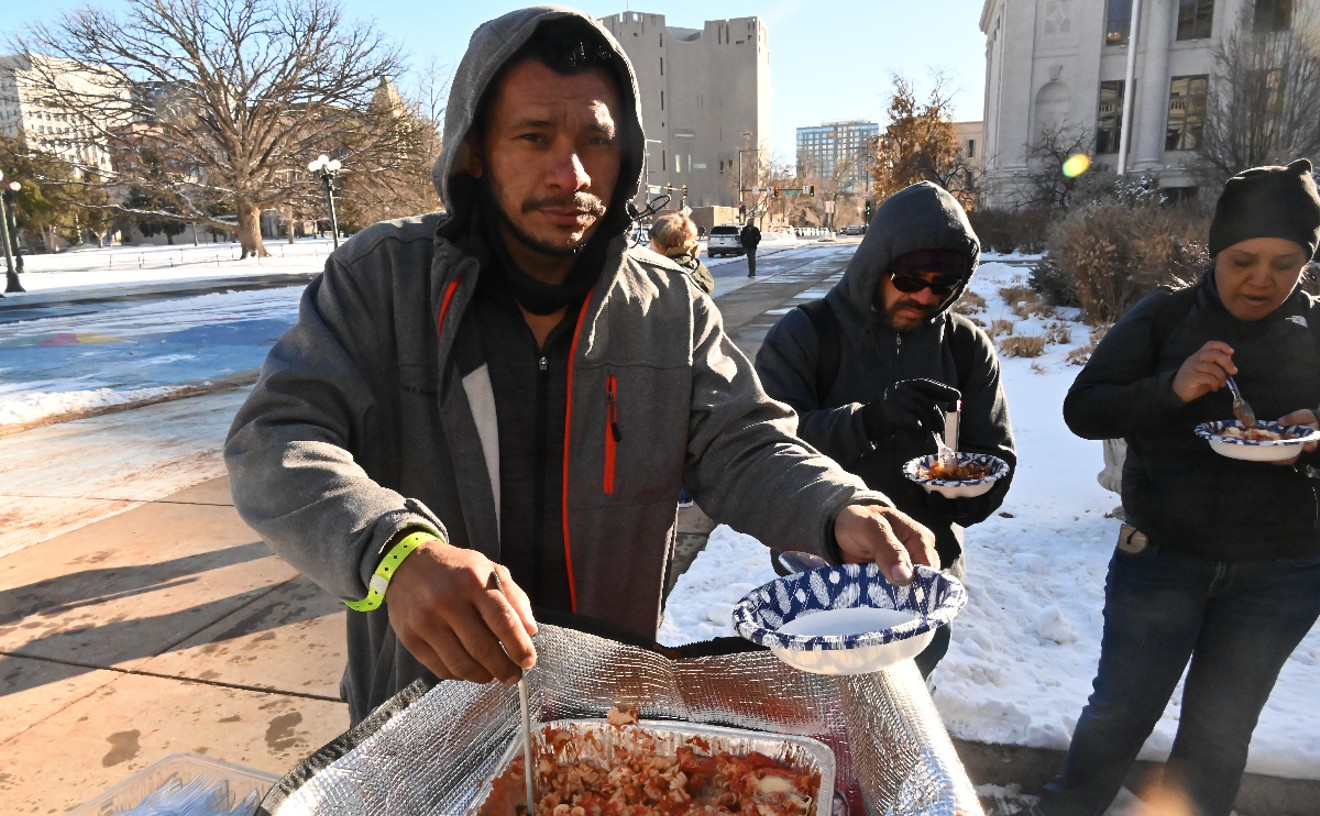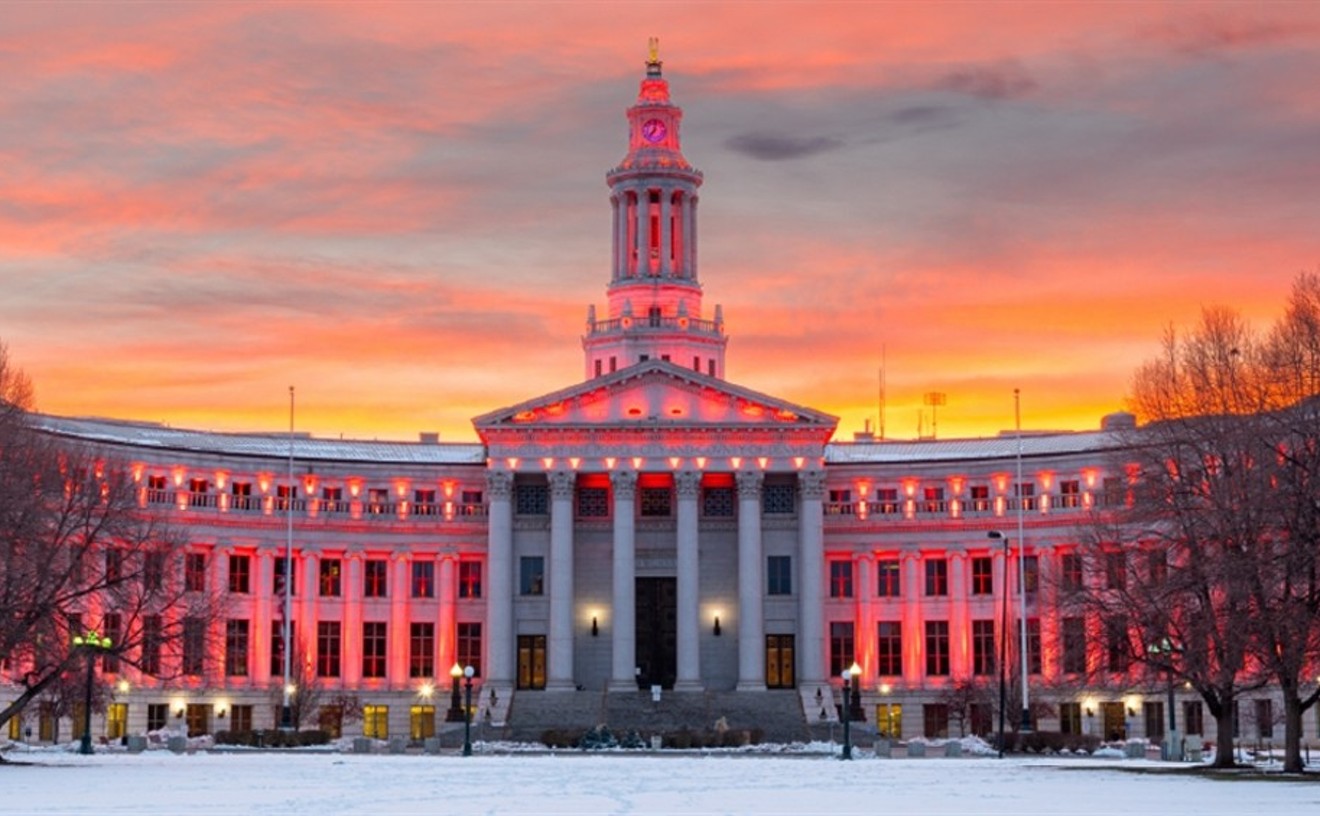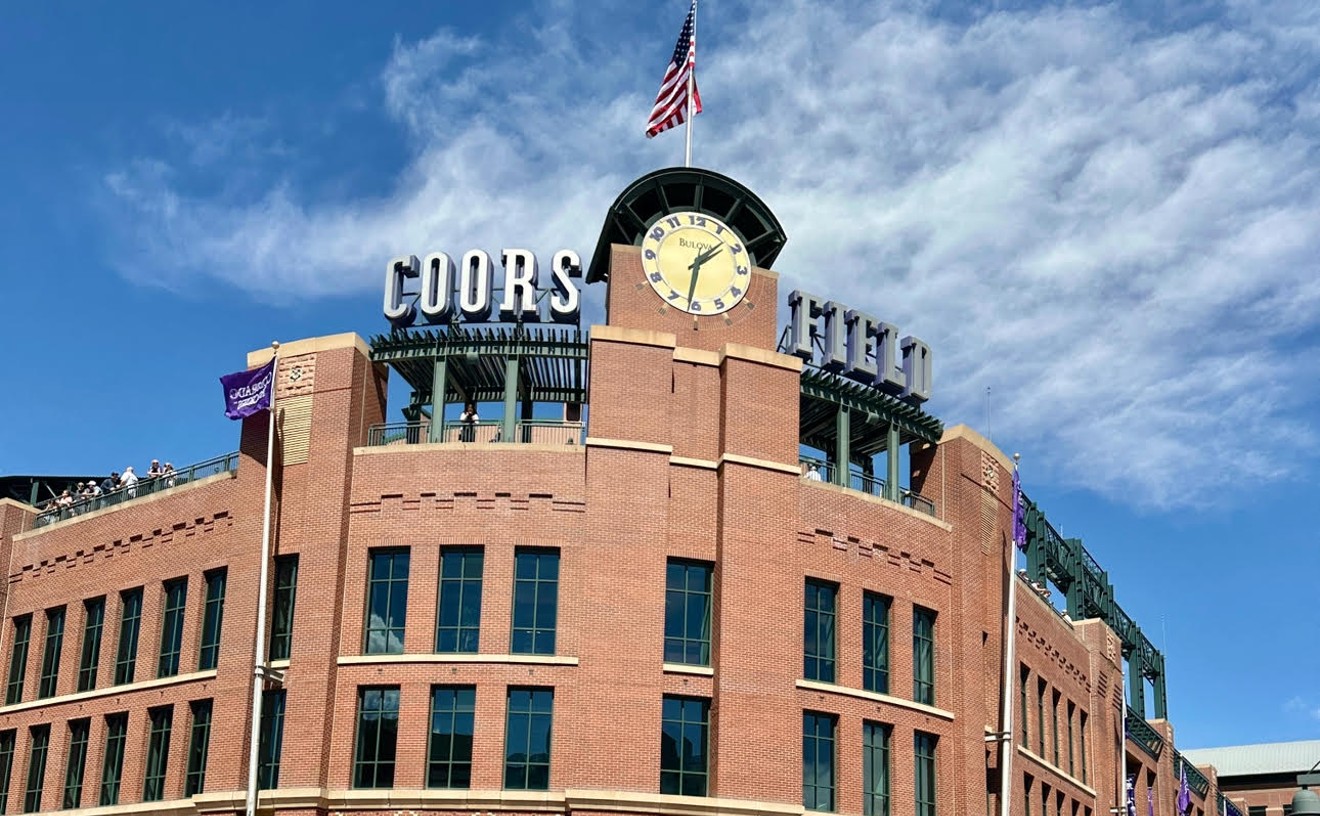Poor Lawson, who's only 42, is overmatched. Hardney is a three-time national amateur champ and former pro contender as a light-heavyweight. Lawson has that nervous look in his eyes as Hardney moves in on him, that slightly panicked smile that says, "We're just havin' fun here, right?"
Hardney certainly is. This is his first time in a ring in two years, and his smile threatens to explode from his mouth. But 54 is not 24, and after three minutes Wild Bill is winded for the night.
"You still got the moves," Lawson says appreciatively, "but you've gotta give up on those Lucky Strikes." To which Hardney shakes his head--no way--and laughs.
His laugh is spontaneous and combustible. It's a rumbling train that derails without warning from a throaty voice so deep it's often hard to make out what he's saying.
At his small home in Aurora, he laughs while leafing through his big blue scrapbook. A Golden Gloves champ from 1962 through 1964, Hardney was asked to try out for the 1964 Olympic team but decided to turn pro instead. He's sparred with Sonny Liston, George Foreman, Archie Moore and Rubin "Hurricane" Carter. His own career--streaky with flashes of talent--ended with a 78-8 record--barring the ten or fifteen fights he says he tanked at the end of his career.
Writers and promoters called him the "Clown Prince of Boxing," though in reality he was a prisoner of many busted dreams and bitter moments. Stepping into the ring against Hardney was like stepping into a three-ring circus, with Wild Bill as the ringmaster. He might pull your shorts down--like he did to his foe in a 1990 exhibition fight in Denver--or shake his ass at you before putting you away, like he did to his last official opponent in 1978.
"I never took boxing seriously," Hardney says. "It was a game. It was fun. I enjoyed it. It kept me out of trouble."
"He didn't respect nobody," says Bob Foster, Hardney's friend and rival and light-heavyweight champion of the world from 1968 to 1975. Foster, now retired in Albuquerque, should know: He had to defend his title against Hardney in February 1970. In his only title shot, Hardney went down twice in the third round. The ref stopped the fight at the end of the fourth, giving Foster a victory by TKO.
But in a photo of Foster after the fight, the champ's face clearly resembles an overripe plum. Hardney points to it and insists that he was the one who did the damage. Foster recalls that a Hardney head butt caused the gash over his left eye. Hardney remembers it as "a right followed by a left hook" and adds, "I beat the hell out of him."
Foster told reporters at the time that Hardney was a "tough kid--I wouldn't mind taking him with me as a sparring partner." By then, Hardney had already been sparring with Foster for two years. In fact, he was better known for helping other fighters than for helping himself. The jokester could have been unstoppable, some people say, if he had worked harder and partied less.
A Baltimore newspaper covering a fight between Hardney and Eugene Bethea in March 1972 marveled at Hardney as the boxer who "had to be seen to be believed." In the first round, according to the paper, "Hardney suddenly stopped in the middle of a furious exchange, pretended to be hurt and fell against the ropes. Bethea, sensing the kill, closed in. Hardney took two solid shots to the chin and started laughing as he pushed his opponent out into the center of the ring and nailed him with a hard right.
"In the second, Hardney was doing some heavy body punching when Bethea hit him with a light jab. Wild Bill stepped back and held his eye with one hand and summoned his man towards him with the other. Bethea hesitated. Hardney switched hands. Now his right held his eye and the left was urging the man towards him.
"In the third, Hardney so bamboozled the willing Bethea that he stood directly in front of him with his hands down, defying him to attack. Bethea finally obliged and Hardney planted a left hook on his whiskers.
"Finally, in what had to be the most hilarious episode seen in a Baltimore ring, Hardney again held his eyes after a jab and summoned Bethea to him with the other. No dice. As further inducement, Hardney put the summoning hand behind his back. Bethea liked the odds and attacked. Hardney knocked him cold with a straight right followed by a left hook."
As it turned out, Hardney also suffered his own share of knockdowns. ("You remember getting hit," he recalls. "There's a big light--you don't know nothin'.") And some of them have happened outside the ring.
After moving to Denver in 1984, he settled into a job with AT&T as a building mechanic. He talked of opening up a boxing gym, but it never happened. The eldest of his four daughters killed herself one night in 1986, and Wild Bill himself, a notorious drinker, lost his job in 1991 when he wrecked a company truck.
The man who often made $1,000 a fight, $100,000 against Foster, just left a job with a sewer company that paid $10 an hour.
Hardney insists there are no regrets, not now or ever, and his laughter and air of contentment seem convincing. But others aren't so sure. Like Dallas Sherman, a friend of the Hardneys who's enjoyed many days getting together and watching fights with Hardney, listening to him spin stories. "You sense," Sherman says, "that sometimes when he's talking about guys he ran around with, guys he fought, he does sometimes regret that it got away. He gets kind of moody."
Sherman adds, "I don't think he'd have been Tyson, but he wasn't the kind of guy you would want to step into the ring against."
"I don't understand how he got into boxing," says Hardney's younger brother Glen. "The guy cried over everything. He picked up every stray animal."
Yet William Louis Hardney, who was born in 1941 in Rayford, North Carolina, the ninth of eleven children, was also a tough egg. He grew up in Steubenville, Ohio, then Egg Harbor, in southern New Jersey, then rough-and-tumble Newark. His mom and older sisters raised him and the young ones. Hardney doesn't say much about his father, except that he was the first black to head an American Legion post in Ohio and was severely injured in a crane accident at a steel mill in 1948, when little Louis was seven.
Hardney recalls picking up the boxing bug at a friend's house. "He was the only guy that had television," Hardney says, "and we just watched Cavalcade of Sports. We used to watch fights all the time. So I told him, 'That's what I want to be: a fighter.'" His boxing debut, however--at age fourteen, in a crowded Elks Club center in Steubenville--was inauspicious. Hardney says he got popped on the head enough to realize he didn't care much for boxing. So he turned to baseball, where he excelled as a catcher and attracted some scout interest.
Hardney moved with his family to Egg Harbor in 1955 and headed upstate to Newark two years later. In New Jersey, and particularly in Newark, Louis Hardney started getting "involved in things I had no business doing."
He made the rounds of every reform school in New Jersey, he says. "Every time I'd get out I'd tell them, 'See you next week.' Wasn't nothin' to it." But as he drifted in and out of reform schools for four years, Hardney made some important acquaintances. The first was an Army sergeant named Hare who ran a summer camp at which Hardney boxed and played basketball.
Then, around 1956 or 1957, Hardney met a "bad son of a bitch," a would-be boxer named Rubin "Hurricane" Carter. A decade later Carter would become a cause clbre after being accused of killing three whites in a New Jersey bar. (And Hardney would become a minor character in the drama as an erstwhile alibi for Carter.) But at the time, Carter was just someone that Wild Bill Hardney "didn't mess around" with, though the two became friends of a sort and fought each other a couple of times. Who won? "I won," Hardney says, smiling.
Hardney left reform school for the final time in 1959, and a few years later he saw Hurricane Carter again. On television. Knocking someone out in the first round. Inspired, Hardney decided to get back into boxing. (His decision had been made easier when a promising tryout opportunity with the Los Angeles Dodgers fizzled after his reform-school past was unearthed.)
"They still remember me in Newark," Hardney says with pride. "Hurricane Carter, Sonny Liston and I were known as the party boys. We didn't like training. I'd drink seven days a week, anything for a laugh. The party life stopped me."
Still, Hardney won the national Golden Gloves championship in 1963--though he says he was drunk. He had been drinking on a night he wasn't scheduled to fight, and when the schedules changed, he fought anyway. He finished his amateur career at 90-2, earning a tryout for the Olympic team. Hardney passed on the chance. "The Olympics weren't a great big huge thing like it is today," he says. "I could fight in Madison Square Garden for four rounds and make $1,000. That's a lot of money."
So he started earning his share, winning seven of his first eight professional bouts. "When I got in the ring, I won the fight already," he says, recalling his cocky attitude. "That ring is mine. That's the way I felt: This is mine. I gotta keep it. Get him out of the ring."
A close look at Hardney's face shows that he took his licks, too. His wife, Harriet, points out the delicate creases around his lips and eyes--the right eyelid and brow are a patchwork of tiny crisscrossing lines of impact.
Wild Bill suffered his first real setback in July 1965. It came outside the ring, but it had everything to do with what went on inside.
Home in Ohio, his mother had planned to come see him fight in Akron--it would have been her first time watching him--but she confessed to him the day before the fight that she was about to die. And she did. "The day after she passed, he knocked the guy out in the first round," Glen Hardney remembers. "Then he buried Mom the next day."
Hardney took her loss hard. "He was more like the baby," Glen says. "He and my mom were really close." Like many other athletes from poor families, Hardney had dreamt of supporting his mother with his winnings. Hardney lost his next four bouts, and he says he knew "I didn't want to fight anymore. I said to hell with boxing."
From the time of his mother's death until his retirement more than a dozen years later, Wild Bill flitted in and out of boxing. His career peaked briefly in 1970 and then slid back down, though he often garnered publicity for his antics inside the ropes. He wound up working in construction primarily to support himself and, after marrying Harriet Caldwell, also in 1970, his family. But a friend, Jimmy Skelton, says Hardney took construction even less seriously than he took boxing: "He was not a construction person. So he came to construction 'cause the money was pretty good. He'd have been much happier had he been boxing."
Like a lot of other fighters, Hardney spent at least as much time as a sparring partner for big-name boxers as he did fighting his own fights. He worked with Archie Moore in 1961, as Moore was ending his career with a loss against Cassius Clay. And he reunited with Hurricane Carter, becoming his sparring partner and drinking buddy throughout the mid-Sixties.
A better influence, however, was Bob Foster, whom he met in 1967 at a training camp in Chatham, New Jersey. He and Foster developed a friendship outside the ring. "Bobby did a lot for me," Hardney says. "I think Bobby's mother died a couple years before mine." On Foster's suggestion that Hardney could make more money by sparring with him, Wild Bill left Newark for Washington, D.C.
"He was a good fighter if he had his heart in it," Foster recalls. "I guess he figured that all he could do was get other guys in shape."
Hardney's brother Glen sees a deeper significance: "It's the kind of guy he is--making somebody better to help fulfill their dream. His dream died with Mother."
Looking back, Hardney saw himself at the time as the "best sparring partner in the world. That's why everybody got me. I could look at how you fight one night and fight just like you the next night."
But while Wild Bill sparred, Wild Bill partied. He fought occasionally, too--once competing in four fights in four states in four nights. He lost them all, and boxing commissioners warned him not to do it again. His reputation grew among reporters to the point where he'd tell them to bring booze to interviews if they wanted to talk.
Somehow he managed to mix his drinking and training. "He liked to party a lot," recalls Foster. "That's all he did, but he just got exceptionally strong. He could drink half a pint of vodka and then run five miles. He'd go to a party, come back at two or three, then get up at six and do roadwork."
And the roadwork did pay off when he got a title shot against his friend Foster in 1970. Foster got the win, of course, but Hardney swears he would have won--he would have been light-heavyweight champ of the world--if he had been in better shape. That's a claim he also makes of the seven other losses he suffered as a pro.
Hardney, who always gets the last word, insists, "I did win the world's light-heavyweight title--out on the orange field one day." One morning in Florida, he and Foster squared off in a bare-fisted dukeroo and, Hardney claims, laughing, "I whipped his ass."
Foster--who successfully defended his title fourteen times before retiring in 1975--has a simple rejoinder: "Wild Bill couldn't beat me if he had three arms." That may be true, but Hardney had more success against the rest of the field. Between 1972 and 1978, he says, he ran off eighteen consecutive knockouts. "I used to fight all kinds," Hardney says. "I was lucky to knock a lot of guys out. I hate training."
That attitude was catching up with him by the late Seventies, as he approached forty. In 1978, on his brother James's birthday, he recalls, he won a bout. "Then I looked to the crowd," he recalls, "and said, 'That's it. I'm tired of this.' And that was my last fight."
Well, almost. He fought under assumed names now and then to make a few extra bucks.
"I have never really taken a fall," Hardney says. "What they do to me is, when they call me they know I'm out there drinkin', so they know I ain't in no condition. So I took a lot of fights like that. I did it for money."
Eventually, Hardney moved to Denver, where several siblings, including brother Glen, lived. He took a job with AT&T as a building mechanic and looked forward to enjoying himself and his four daughters. He had no desire to get back in the ring, except to work with a friend's son or one of his own daughters.
Then, on New Year's Eve 1986, came a punch that sent him to the canvas.
Bill and Harriet's eldest daughter, sixteen-year-old Carla, took an overdose of drugs. "She went down in the medicine cabinet downstairs in the bathroom and took just about everything she could take," Harriet recalls. The family rushed her to the hospital, and she seemed to be recovering. So they went home for the night and made plans to visit her first thing in the morning. "We felt she'd be all right," Harriet says. "But by the time we got to the door of our house the phone rang, and they told us we had to come up to Children's Hospital. And they told us she had passed away." Carla didn't leave a note, and the Hardneys say they had no indication something had been wrong.
"It's the worst thing that could ever happen to a man," Hardney rumbles. The family no longer celebrates New Year's Eve.
"It devastated him," Dallas Sherman says. "He couldn't figure out why it happened. It turned him into a hollow shell of a man for a long time." Hardney began drinking more, and on April Fool's Day in 1991, he was arrested after he wrecked an AT&T vehicle while driving under the influence. Hardney spent a year going to Alcoholics Anonymous meetings, he says, "but I didn't get my job back." Since then, he's bounced around from job to job.
"He's cut way back on his drinking," says a friend, Delbert Smith. But Smith wonders if "the way his career turned out had something to do with his drinking, rather than vice versa."
These days, things seem mellower. Wild Bill says he hasn't had a drink in a few months, one of his daughters has just given birth to a girl and another daughter is pregnant. The Hardneys' youngest, Gina, is now seventeen and once had the boxing bug herself. Wild Bill, who gave her some lessons, says, "She can handle a boy."
Harriet Hardney say that since Carla's death, she and her husband "just notice the other children [we] have and try to see if anything's bothering them."
Wild Bill still survives on videotape. As late as 1990, when he was nearly fifty, he fought exhibitions. And he was still clowning around.
In a fight with a fifty-year-old named Vincent Goodnight, Hardney can be seen coming into the ring wearing a cowboy hat and fur coat. As he takes off the coat, his gut looks as if he had swallowed a medicine ball. But the swagger is still there. And the pranks. Goodnight's pants are pulled down in the second round, and while he gathers them up, Hardney leans against the ropes on the other side of the ring, basking in the applause of the crowd.
And in the third, after pressing the attack, Wild Bill Hardney, the clown prince and almost-champion, lands a sweet left hook. Goodnight's face freezes in genuine surprise, and then he drops to the ground like a statue.










